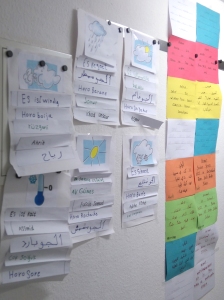One student is nervous. You can see he is newer than the others and he is not yet so confident about it. He starts reading a few sentences in German from his student book after hearing them from the teacher.
 Learning a new language is hard, especially when you are not a child anymore. Learning German is really hard, especially for an Arabic speaker – I should know. I’ve tried and am still trying, though not through regular lessons. I listen to the words said by my German friends many times before having enough courage inside to say them out loud. The pronunciation is hard, especially when you try to utter it in front of a native speaker.
Learning a new language is hard, especially when you are not a child anymore. Learning German is really hard, especially for an Arabic speaker – I should know. I’ve tried and am still trying, though not through regular lessons. I listen to the words said by my German friends many times before having enough courage inside to say them out loud. The pronunciation is hard, especially when you try to utter it in front of a native speaker.
The Syrian student gathers his courage and says the sentence out loud. He gets a thumbs-up from the teacher and a sense of relief dawns on his face. He is one of around six students in this class. They are all refugees, mainly from Syria and Iraq. They come to Interkultur centre in Bonn to learn German. Interkultur is a state-approved training institution, founded in 2007, and focuses on providing training sessions to migrants.
The course they are taking is for those who still do not have official residence in Germany. It lasts for six months. If their application is approved, they can participate in a longer course with a focus on integration, where they not only study the language but also learn about history, politics, culture and the social system in Germany.

Outside the classes, papers hanging on the wall have learning notes with hand drawn pictures about the weather. “It’s raining. It’s sunny. It’s snowy.” The weather is usually one of the first topics people learn when approaching a new language. Next to the weather notes, there are other notes hand written by the refugees in both Arabic and German. The notes are titled “Home.” In few words, they convey their feelings about their hometown and their new one.
One Syrian refugee chose to dedicate the small space he wrote in Arabic to his hometown, Afrin, in northern Syria. He wrote: Home. Afrin. Beautiful. Very. The Trees. The Olives. The Fresh Air. The High Mountains. Goodbye.
 The German part showed his view on Germany. He said it was beautiful and had a lot of trees and rivers. This particular one was different from the other notes, where the Arabic and German notes were almost saying the same. It seemed as if he did not feel his German was strong enough yet to allow him to describe his lost home.
The German part showed his view on Germany. He said it was beautiful and had a lot of trees and rivers. This particular one was different from the other notes, where the Arabic and German notes were almost saying the same. It seemed as if he did not feel his German was strong enough yet to allow him to describe his lost home.
Text & Fotos: Nehal El-Sherif
Thank you very much Nehal for this beautiful text!
LikeLike